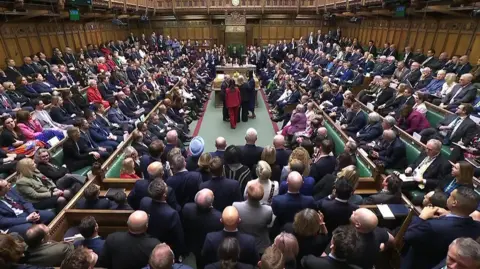In recent discussions within the UK Parliament, two significant issues have stirred intense debate among Members of Parliament (MPs): the decriminalization of abortion in England and Wales and the consideration of legalizing assisted dying. These deliberations represent pivotal moments in British legislative history, emphasizing the evolving perspectives on reproductive rights and end-of-life options in the country.
Traditionally, MPs are guided by party loyalty, strategic patronage, and the discipline enforced through the whips, individuals tasked with ensuring party coherence during votes. However, in a departure from standard practices, MPs have been granted unprecedented freedom regarding their votes on these critical issues. The upcoming decisions on abortion and assisted dying mark rare instances where MPs can express their individual convictions without party pressure.
On Tuesday, the House of Commons voted overwhelmingly in support of decriminalizing abortion—a landmark shift in reproductive rights that had remained largely unchanged for nearly six decades. With a majority backing of 242 votes, the legislation reflects a significant transformation in public sentiment regarding women’s rights to make choices about their bodies. This change illustrates the willingness of lawmakers to adapt to contemporary views on reproductive health and autonomy.
Following this transformative vote, attention now shifts to the impending discussion on assisted dying, scheduled to take place on Friday. This complex issue intertwines healthcare and justice, presenting an array of ethical, legal, and emotional challenges. The dialogue surrounding assisted dying has historically invoked a spectrum of opinions, and the upcoming vote is anticipated to be closely contested. The most recent parliamentary session addressing this topic saw a narrow majority of 55 votes favoring change, yet the landscape may have shifted since then, as several MPs reconsider their positions.
The unique designation of these votes as “conscience votes” reflects the nuanced nature of the issues at stake. By categorizing them as free votes, party leadership allows MPs the autonomy to align their decisions with personal beliefs rather than party doctrine. Such freedom can be both liberating and a source of anxiety, as some politicians express discomfort with the isolation of making decisions independently.
Prime Minister Sir Keir Starmer is known for his support of both abortion rights and assisted dying policies, although he has been careful to refrain from directly influencing party members during this process. His acknowledgment of women’s rights concerning abortion has been a longstanding position, asserting that women deserve access to safe and legal abortion services. Additionally, Starmer has consistently expressed his support for assisted dying since serving as chief prosecutor, where his experiences informed his perspective on the issue.
As MPs grapple with their decisions, the political climate is characterized by mixed feelings. While many are excited by the opportunity to assert their values, others feel the weight of responsibility and the reality of diverging opinions within their parties. This scenario is particularly highlighted by prominent figures such as Health Secretary Wes Streeting and Justice Secretary Shabana Mahmood, both of whom oppose assisted dying despite the likelihood that their respective departments may need to implement the policy if approved.
The current dialogue exemplifies a broader shift in societal values and ethical considerations surrounding life, health, and personal autonomy. As the UK Parliament navigates these profound decisions, the outcome will not only reflect the collective conscience of its members but also resonate with the public and influence the cultural landscape regarding highly sensitive issues like abortion and assisted dying for years to come.
In conclusion, as the UK stands at a critical juncture of social and moral evolution, the votes on abortion decriminalization and assisted dying could be seen as defining moments in the current parliamentary session. The process highlights the complex interplay between personal beliefs, party politics, and the evolving narrative on what constitutes individual rights in a progressive society. The coming days will undoubtedly be crucial in shaping not just the laws, but also the national discourse on these pivotal topics.



